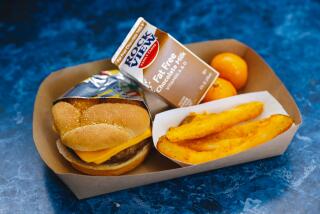Report Card on Diet and School Grades
- Share via
Tired of nagging your kids to get better grades? A Washington state researcher has a breath-saving alternative that may also reduce your food bills.
Pay equal attention to family diet and homework, and you might just be looking at a report card full of A’s, contends Alexander Schauss, a nutrition and behavior researcher who directs the nonprofit Foundation for Biosocial Research in Tacoma, Washington.
The link between diet and performance--both in the classroom and in athletics--is strong, Schauss says, but it is not always given enough consideration by parents and educators.
He proposes a 12-week plan to gradually wean kids from a diet high in sugar and fat to more nutritious meals and snacks. He outlines the particulars in a new book, “Eating for A’s” (Pocket Books).
Specifically, Schauss proposes menus with foods rich in what he calls the “12 learning nutrients.” These are vitamins and minerals that help the body convert foods to energy and boost concentration. (On his “A” list: Vitamins A, B-1, B-2, B-3, B-6, C and folic acid; iron, magnesium, potassium, zinc and chromium.)
The key, Schauss says, is to phase out processed meats and cheeses and introduce more fresh fruits and vegetables, veggie-turkey burgers, salmon and other more nutritious items. Typical menus are healthful but not necessarily Spartan. A typical dinner, for instance, has soup, grains, vegetables and a main course of fish, meat or pasta.
There’s no guarantee that the diet will land your scholar on the honor roll, but Schauss says it’s not impossible. He tells the story of 9-year-old Ricky, a C-minus student who pulled down A’s and Bs within three months of cleaning up his diet.
Schauss even offers ideas on how to overcome resistance from pint-sized junk food addicts:
* Call a snack of assorted nuts “Athlete’s Mix.”
* Make dinner conversation as pleasant as possible.
* Be devious when necessary. Sneak vegetables, for instance, into meat loaf, hamburgers and other kid-approved foods.
How hard is it to give up the junk food habit? Schauss passed out advance copies of his book to 10 Tacoma families and says many told him it wasn’t as gruesome as they had feared. “And some cut their food budget by half,” adds Schauss, whose own two children follow the plan.
A local dietitian believes Schauss’ plan has merit.
“Certainly, poor diet has been associated with reduced ability to concentrate,” says Diane Whelan, a Beverly Hills registered dietitian. “My concern, though, is how easily you will convince a child that a turkey-burger is as good as a (beef) hamburger.”
Moderation, not deprivation, is the key, she believes.
“Processed American cheese, for instance, still provides calcium and protein,” she says.
She tells families to stand a middle ground nutritionally, to let the kids treat themselves occasionally. Kids never allowed junk food, she fears, may be set up for eating disorders later.
When she asked one child from a very health-conscious family that forbids all junk food about future plans, the child replied: “I want to buy a sports car and cruise doughnut shops.”






